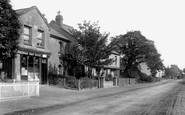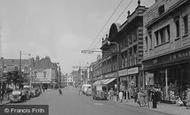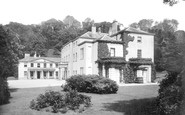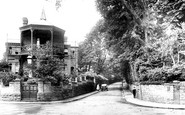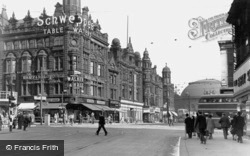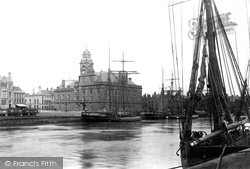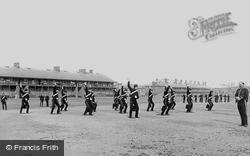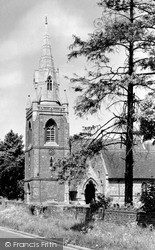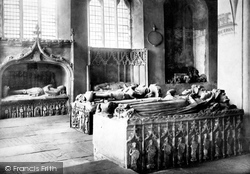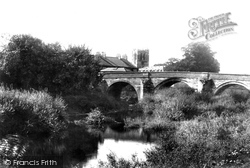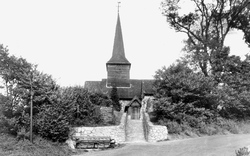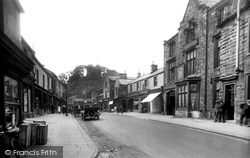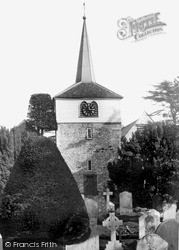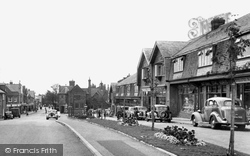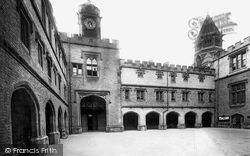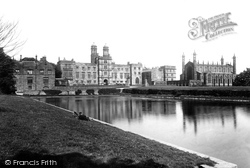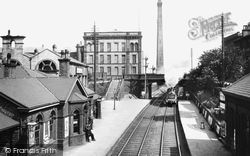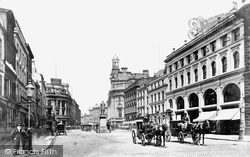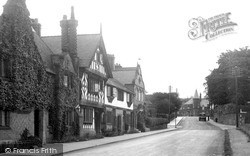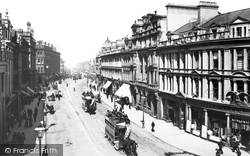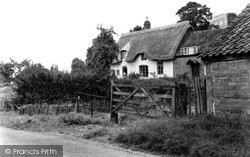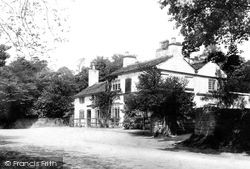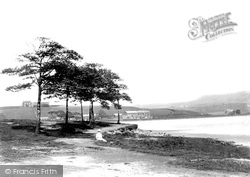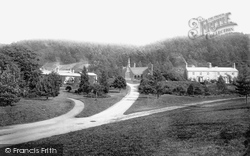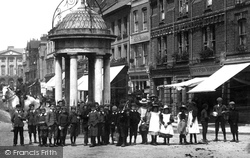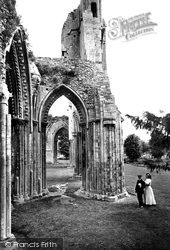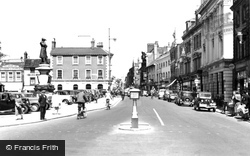Places
Sorry, no places were found that related to your search.
Photos
5 photos found. Showing results 1,001 to 5.
Maps
83 maps found.
Books
Sorry, no books were found that related to your search.
Memories
1,127 memories found. Showing results 501 to 510.
Apsley Cottage.
My father's family lived in the cottage with the arched windows next door to the post office. The house was named Apsley Cottage. My grandfather Henry Briggs was a career soldier in the Royal West Surrey Regiment. He served in the ...Read more
A memory of Ash in 1900 by
St Von Tromp (Public House)
Hi there, just wondered if anyone knew any information or of any photos of a pub at 70 Church Street called The St. Von Tromp, which closed in December 1922? There would have also been a theatre/music hall in the area...? If anyone can help it would very much appreciated. stellabellatak@aol.com
A memory of St Helens in 1910 by
Ebenezer Owen Davies
Ebenezer Owen Davies was a carpenter in 1914 who took in my father, Thomas William Banks aged 14 from the New Orphan Houses, Ashley Down, Bristol - I am endeavouring to find out more about what happened to my ...Read more
A memory of Bryngwyn in 1910 by
Peakirk Railway Crossing
It is not really my memory but something others may or may not remember. My mother's family came from Deeping St James - Sanderson was the name and this relates to a William Sanderson who was killed at the Peakirk crossing ...Read more
A memory of Peakirk in 1910 by
Newton Abbot, Haccombe House 1890
My mother lived at Haccombe House and worked for Lord & Lady Carew from the age of 13yrs. in 1914 until about 1930. The Carew family had other residences in London, Highcliffe (Bournemouth), and South ...Read more
A memory of Newton Abbot in 1910 by
My Grandmother
My grandmother had to work in the flaxworks during the First World War and caught her arm in a machine and severed it! I was told she was taken to Yeovil and spent many weeks in this hospital. In 1964 I spent two weeks in here but for a much nicer reason, my first son was born.
A memory of Yeovil in 1910 by
Scarning School
At the age of 5yrs I started my education at Scarning School, I lived at Woodhill [see memory of Dereham] which meant about a 2 mile walk to school with my 10 yr old sister usually stopping to play in the stream at Podmore on the ...Read more
A memory of Scarning in 1920 by
Pitch Place House
Hi, does anyone have any photos or info on the very grand, old, large manor house in Worplesdon, in the 1920's era or earlier? I believe it was the home of Lord and Lady Dewvine (not sure that is the correct spelling). My ...Read more
A memory of Worplesdon in 1920 by
Miss Meriel Alexander
Who was Muriel Alexander? I have a scrapbook that she put together after the 1st World World. I think she was very much involved with organising trips to visit war graves and monuments for families of the fallen. Would be very ...Read more
A memory of Boldre in 1920 by
Hebburn On Tyne
My Grandfather Thomas Hugh Devlin (Tom), retired Fire Commander, was born in Hebburn On Tyne, England on 25th August 1923. If anyone has any photos, information or memories, it would be much appreciated.
A memory of Hebburn in 1920 by
Captions
1,233 captions found. Showing results 1,201 to 1,224.
With the help of the architect Frank Matcham they created a magnificent series of arcades, which are still much admired.
Much of it was carried by wherries, clinker-hulled double-ended barges, that carried a single loose footed gaff sail of about 1200 sq ft.
In 1877 the barracks became part of the much larger Infantry Barracks housing 1350 men. The last horses were retired in 1939, and the Cavalry Barracks were demolished in 1971.
The back arch has strap work and trophies.
The third Herbert tomb in this chapel (to the left) is the elaborate arched tomb of Sir William Herbert's natural son Sir Richard Herbert of Ewyas.
This bridge carried much coaching trade, as it was on the main London to York road.
The timber is about 700 years old, and the bell turret rests on an arched frame of timber.
Notice the stage-coach arch next to the bay windows: the stage coaches to Preston and Blackburn left from here.
Of special interest are the font (early Norman) and the Doom painting above the chancel arch.
The centre of Heswall was originally much closer to the shoreline, probably in the area around Village Road and St Peter's Church, but the advent of Telegraph Road - the A540 - has moved the commercial
Cloisters with studies above run to the south and east of Old Quad, with a tall arch forming the entrance to the School House dining hall at the south-eastern corner.
One thing to be said for Stafford (as far as anywhere can make such a claim in these unsettled times) is that it is a town without a darker side.
The estate is over 2,000 acres, much of which is farmed. The church of St Peter can be seen to the right of the picture.
Titus Salt created a community very much to his own pattern at Saltaire.
The buildings on the right were put up around 1835; the one with rounded window arches was for a long time the booksellers Sherratt & Hughes, and later Waterstone's - it then became WH Smiths while the
This village is referred to as 'Torintone' in the Domesday book, but during the reign of Edward II it, and much of the surrounding land, came into the possession of Roger de Thornton, whose only daughter
Everything seems to have operated on a small scale, and no doubt with much footwork as well as letter-writing. Telegrams could be sent from the massive General Post Office Building.
What is particular about Gloucestershire is that it offers so much variation in landscape. Uplands such as Cleeve Common spread beyond the Cotswold escarpment.
It always started in church, but apparently few people paid much attention to the religious service; they were too busy checking out their neighbours.
Healey Dell has been an attraction of a different type for much longer, probably since Anglo-Saxon times. In 1905 the Edwardian Falinge Park was opened north of Rochdale centre.
Between the road leading up to the mission house and the track forking off to the left of it, lies the village green, very much the heart of the village and a place where generations of village children
The Board brought about swingeing changes in Chelmsford - although much of it was a question of getting the townspeople to alter things they were perfectly happy with.
Thereafter much of the stonework of the abandoned abbey was robbed for re-use elsewhere. In 1907 the site was bought on behalf of the Church of England.
The Jaegar Shop on the extreme left of the picture conjures up memories of tweeds and country pursuits; nowadays the branch is much more fashion orientated, but nevertheless to be found on the High Street
Places (0)
Photos (5)
Memories (1127)
Books (0)
Maps (83)

